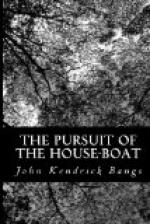“What was the incident of the lost tiara?”
[Illustration: “Poor old Boswell was pushed overboard”]
“I am about to tell you,” returned the stranger; “and it must be understood that you are told in the strictest confidence, for, as I say, the incident involves a state secret of great magnitude. In life—in the mortal life—gentlemen, I was a detective by profession, and, if I do say it, who perhaps should not, I was one of the most interesting for purely literary purposes that has ever been known. I did not find it necessary to go about saying ‘Ha! ha!’ as M. Le Coq was accustomed to do to advertise his cleverness; neither did I disguise myself as a drum-major and hide under a kitchen-table for the purpose of solving a mystery involving the abduction of a parlor stove, after the manner of the talented Hawkshaw. By mental concentration alone, without fireworks or orchestral accompaniment of any sort whatsoever, did I go about my business, and for that very reason many of my fellow-sleuths were forced to go out of real detective work into that line of the business with which the stage has familiarized the most of us—a line in which nothing but stupidity, luck, and a yellow wig is required of him who pursues it.”
“This man is an impostor,” whispered Le Coq to Hawkshaw.
“I’ve known that all along by the mole on his left wrist,” returned Hawkshaw, contemptuously.
“I suspected it the minute I saw he was not disguised,” returned Le Coq, knowingly. “I have observed that the greatest villains latterly have discarded disguises, as being too easily penetrated, and therefore of no avail, and merely a useless expense.”
“Silence!” cried Confucius, impatiently. “How can the gentleman proceed, with all this conversation going on in the rear?”
Hawkshaw and Le Coq immediately subsided, and the stranger went on.
“It was in this way that I treated the strange case of the lost tiara,” resumed the stranger. “Mental concentration upon seemingly insignificant details alone enabled me to bring about the desired results in that instance. A brief outline of the case is as follows: It was late one evening in the early spring of 1894. The London season was at its height. Dances, fetes of all kinds, opera, and the theatres were in full blast, when all of a sudden society was paralyzed by a most audacious robbery. A diamond tiara valued at L50,000 sterling had been stolen from the Duchess of Brokedale, and under circumstances which threw society itself and every individual in it under suspicion—even his Royal Highness the Prince himself, for he had danced frequently with the Duchess, and was known to be a great admirer of her tiara. It was at half-past eleven o’clock at night that the news of the robbery first came to my ears. I had been spending the evening alone in my library making notes for a second volume of my memoirs, and, feeling somewhat




